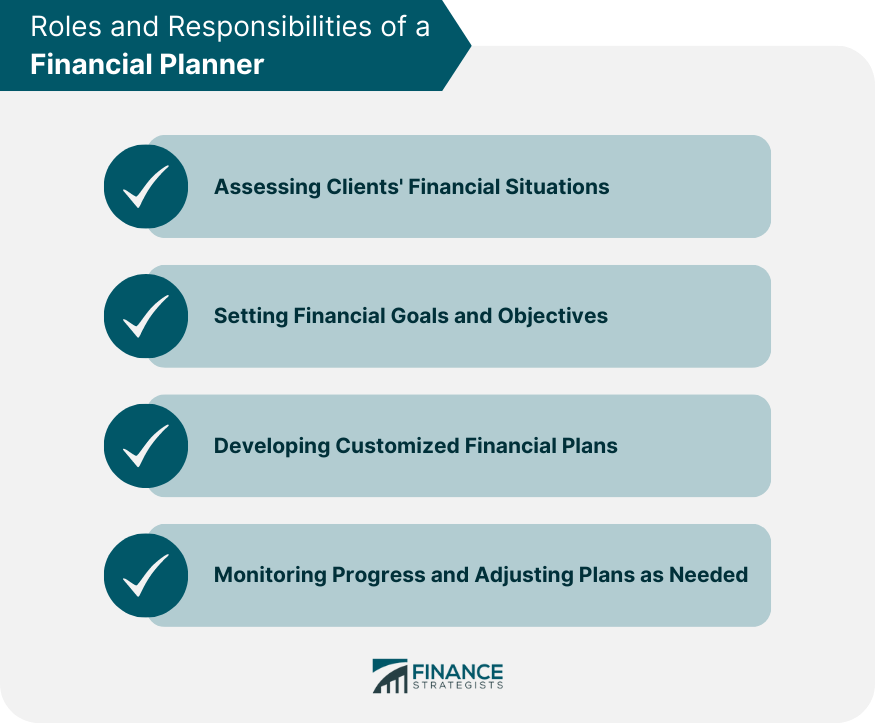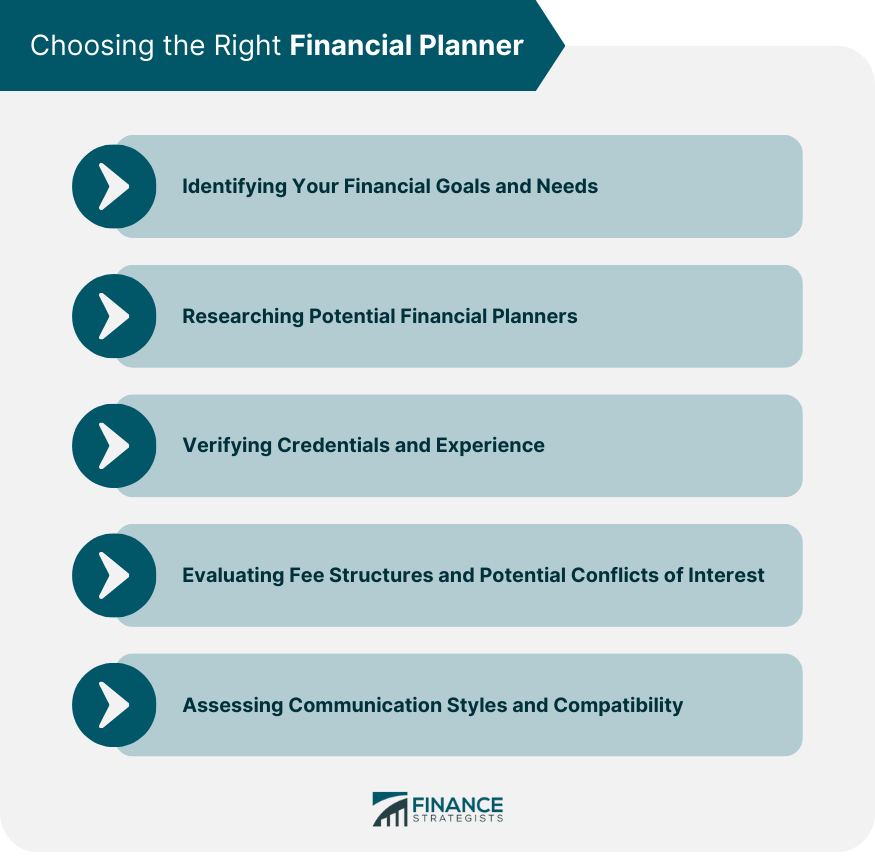A financial planner is a professional who helps individuals and families create and manage their financial plans to achieve their financial goals. They analyze clients' financial situations, identify objectives, and develop tailored strategies to meet those objectives. Financial planning is essential for individuals and families to achieve their short-term and long-term financial goals, such as retirement, education funding, or wealth management. A financial planner can provide valuable guidance and advice to help clients make informed decisions and navigate complex financial situations. Financial planners begin by assessing their clients' current financial situations, which involves reviewing assets, liabilities, income, and expenses. This comprehensive analysis helps them understand their clients' financial positions and identify areas of opportunity or concern. Financial planners work closely with clients to identify and set specific financial goals and objectives. These goals may include saving for retirement, funding a child's education, or building an investment portfolio. Once financial goals and objectives have been established, financial planners create customized financial plans that outline the strategies and actions needed to achieve these goals. These plans may involve recommendations on investment, insurance, tax planning, and other financial management aspects. Financial planners also regularly monitor their clients' progress towards their financial goals and adjust the plans as needed based on changes in clients' circumstances, market conditions, or financial objectives. Fee-only financial planners are compensated solely through fees paid by their clients. They do not receive commissions or other forms of compensation from the sale of financial products. This compensation model minimizes potential conflicts of interest and helps ensure that the planner's recommendations are aligned with their clients' best interests. Commission-based financial planners receive compensation through commissions from the sale of financial products, such as investments and insurance policies. This compensation model can sometimes create conflicts of interest, as the planner may be incentivized to recommend products that generate higher commissions. Fee-based financial planners receive compensation through a combination of fees paid by clients and commissions from the sale of financial products. While this model can still present potential conflicts of interest, it may also provide greater flexibility for clients who prefer a mix of fee and commission-based services. Retirement planning involves developing strategies to ensure clients have sufficient income and resources to maintain their desired lifestyle in retirement. Financial planners may recommend various savings and investment vehicles, such as 401(k) plans, Individual Retirement Accounts (IRAs), and annuities, to help clients achieve their retirement goals. Investment management involves creating and managing an investment portfolio that aligns with a client's financial goals, risk tolerance, and time horizon. Financial planners may recommend various investment products, such as stocks, bonds, mutual funds, or exchange-traded funds (ETFs), and help clients build a diversified portfolio. Estate planning focuses on the management and distribution of an individual's assets during their lifetime and after death. Financial planners may work with clients to develop strategies to minimize estate taxes, protect assets, and ensure the efficient transfer of wealth to beneficiaries. Tax planning involves developing strategies to minimize clients' tax liabilities and maximize their after-tax wealth. Financial planners may recommend various tax-advantaged investment vehicles, such as municipal bonds or Roth IRAs, and help clients take advantage of tax deductions and credits. Risk management and insurance planning involve identifying and addressing potential risks that could adversely affect a client's financial well-being. Financial planners assess clients' exposure to risks, such as premature death, disability, or property loss, and recommend appropriate insurance coverage to protect against these risks. Education funding focuses on developing strategies to save for and finance education expenses, such as college tuition and related costs. Financial planners may recommend various savings vehicles, such as 529 plans or Coverdell Education Savings Accounts (ESAs), to help clients meet their education funding goals. Before selecting a financial planner, it's essential to identify your financial goals and needs. Determine what aspects of your financial life you need help with and what specific services you are looking for in a financial planner. Conduct thorough research on potential financial planners by reviewing their websites, reading client testimonials, and checking their credentials and disciplinary history. You can also ask for referrals from friends, family, or other professionals, such as accountants or attorneys. Verify the credentials and experience of potential financial planners by checking with the relevant certification boards or organizations. Ensure that the planner has the necessary qualifications, such as the Certified Financial Planner (CFP) or Chartered Financial Analyst (CFA) designations, and has experience working with clients with similar financial situations and goals. Evaluate the fee structures of potential financial planners and consider any potential conflicts of interest that may arise from their compensation models. Assess whether a fee-only, commission-based, or fee-based financial planner is the best fit for your needs and preferences. Assess the communication styles and compatibility of potential financial planners by scheduling initial consultations or interviews. Ensure that you feel comfortable discussing your financial situation and goals with the planner and that they are responsive to your questions and concerns. Working with a credentialed financial planner helps ensure that the professional you choose has the necessary knowledge, skills, and expertise to provide competent financial advice tailored to your unique needs and goals. Credentialed financial planners are required to adhere to specific ethical standards and maintain a commitment to professional conduct, providing you with unbiased and trustworthy advice. Many credentialed financial planners, such as Certified Financial Planners, are required to act as fiduciaries, meaning they must put their clients' best interests ahead of their own when providing financial advice and recommendations. Selecting the right financial planner is a critical step in achieving your financial goals and maintaining your financial well-being. By understanding the roles and responsibilities of financial planners, the different types of planners, and the various financial planning areas, you can make an informed decision when choosing a professional to guide you through the complexities of personal finance. Working with a credentialed financial planner can help ensure that you receive competent, ethical, and trustworthy advice tailored to your unique needs and objectives. Furthermore, many credentialed financial planners act as fiduciaries, prioritizing their clients' best interests when providing financial advice and recommendations. This level of commitment to ethical standards and professional conduct can give you peace of mind as you navigate your financial journey. By taking the time to research, evaluate, and select a qualified financial planner, you can confidently work towards achieving your financial goals and securing your financial future.What Is a Financial Planner?
Roles and Responsibilities of a Financial Planner
Assessing Clients' Financial Situations
Setting Financial Goals and Objectives
Developing Customized Financial Plans
Monitoring Progress and Adjusting Plans as Needed

Types of Financial Planners
Fee-Only Financial Planners
Commission-Based Financial Planners
Fee-Based Financial Planners
Common Financial Planning Areas
Retirement Planning
Investment Management
Estate Planning
Tax Planning
Risk Management and Insurance Planning
Education Funding
Choosing the Right Financial Planner
Identifying Your Financial Goals and Needs
Researching Potential Financial Planners
Verifying Credentials and Experience
Evaluating Fee Structures and Potential Conflicts of Interest
Assessing Communication Styles and Compatibility

Importance of Working With a Credentialed Financial Planner
Ensuring Professional Competence
Adherence to Ethical Standards
Fiduciary Responsibility
Conclusion
Financial Planner FAQs
A financial planner is a professional who helps individuals and families create a plan to achieve their financial goals. They can provide advice on topics such as budgeting, investing, retirement planning, and estate planning.
Working with a financial planner can help you create a comprehensive plan to achieve your financial goals. A financial planner can provide guidance on topics such as budgeting, investing, retirement planning, and estate planning. They can also help you stay on track and adjust your plan as your circumstances change.
When choosing a financial planner, it is important to consider their qualifications, experience, and fees. Look for a planner who is a Certified Financial Planner (CFP) and has experience working with clients in situations similar to yours. You should also understand how the planner is compensated and what services they will provide.
Financial planners can be compensated in a variety of ways, including hourly fees, flat fees, commissions, and a percentage of assets under management. It is important to understand how your planner is compensated and how their compensation structure may affect their recommendations.
When working with a financial planner, you should expect to go through a comprehensive planning process that includes setting goals, reviewing your current financial situation, and creating a plan to achieve your goals. Your planner should provide ongoing advice and guidance to help you stay on track and adjust your plan as needed.
True Tamplin is a published author, public speaker, CEO of UpDigital, and founder of Finance Strategists.
True is a Certified Educator in Personal Finance (CEPF®), author of The Handy Financial Ratios Guide, a member of the Society for Advancing Business Editing and Writing, contributes to his financial education site, Finance Strategists, and has spoken to various financial communities such as the CFA Institute, as well as university students like his Alma mater, Biola University, where he received a bachelor of science in business and data analytics.
To learn more about True, visit his personal website or view his author profiles on Amazon, Nasdaq and Forbes.















